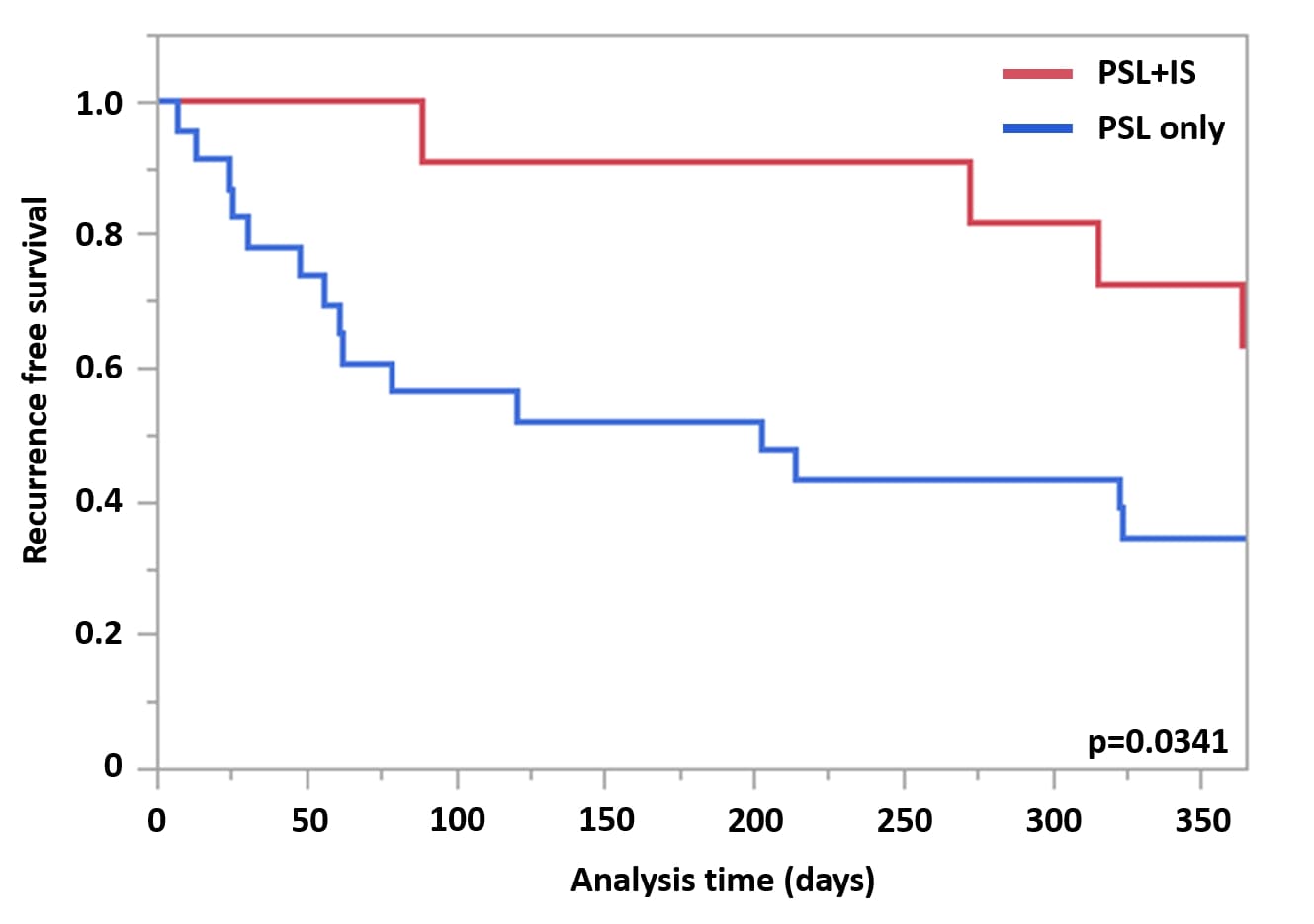Session Information
Date: Friday, November 6, 2020
Title: Miscellaneous Rheumatic & Inflammatory Diseases Poster I: Diagnosis and Testing
Session Type: Poster Session A
Session Time: 9:00AM-11:00AM
Background/Purpose: Relapsing polychondritis (RP) is a rare disease which causes inflammation in systemic cartilages. Although glucocorticoids (GC) and immunosuppressive drugs (IS) have been used, the recurrence rate remains high. It has been reported that tracheobronchial lesion is a poor prognostic factor, however, other risk factors have not been sufficiently investigated. We conducted a retrospective study on risk factors for recurrence.
Methods: We selected patients who had been diagnosed as RP according to Damiani’s or Michet’s criteria and treated at Kyoto University Hospital between 2001 and 2020. We excluded the patients with observation period less than one year and patients who had been taking oral GC for the treatment of other diseases at the time of the diagnosis of RP. Recurrence was defined as 1) aggravation of any symptoms or 2) worsening of the laboratory data that led to intensified treatments.
Results: Forty-one patients were extracted. The mean age at onset was 50±18 years, and the rate of women was 58.5%. The duration of observation was 6.6±5.8 years and the time from onset to diagnosis was 433±903 days. Of the 41 patients, 30 underwent recurrences (73.2%). The number of recurrences was 73 in total and 2.4 per person in average. The median time to the initial recurrence was 202 days. The median dose of prednisolone (PSL) at the first relapse was 10 mg.
The patients were divided into recurrence and non-recurrence groups. In the recurrence group, the patients with tracheobronchial lesion as an initial symptom were more frequent (p=0.0108), and the activity index (RPDAI) (p=0.0178), serum CRP (p=0.0030) and IgG (p=0.0347) levels at the time of onset were higher than in non-recurrence group.
We next compared initial PSL monotherapy group (n=23) with initial PSL plus IS group (n=11) and found that the latter group showed significantly higher recurrence free survival rate at 1 year after initial treatment (p=0.0341, Figure 1).
Conclusion: We found tracheobronchial lesion, high RPDAI, high serum CRP and IgG as risk factors for recurrence. It was suggested that initial combination of PSL with IS could prolong recurrence-free period.
 Recurrence free survival rate between prednisolone only therapy and prednisolone combinded with Immunosuppressant.
Recurrence free survival rate between prednisolone only therapy and prednisolone combinded with Immunosuppressant.
To cite this abstract in AMA style:
Yoshida T, Yoshifuji H, Shirakashi M, Kitagori K, Akizuki S, Nakashima R, Murakami K, Hashimoto M, Tanaka M, Ohmura K. The Risk Factors of Recurrence in Relapsing Polychondritis; A Study of 41 Cases [abstract]. Arthritis Rheumatol. 2020; 72 (suppl 10). https://acrabstracts.org/abstract/the-risk-factors-of-recurrence-in-relapsing-polychondritis-a-study-of-41-cases/. Accessed .« Back to ACR Convergence 2020
ACR Meeting Abstracts - https://acrabstracts.org/abstract/the-risk-factors-of-recurrence-in-relapsing-polychondritis-a-study-of-41-cases/
